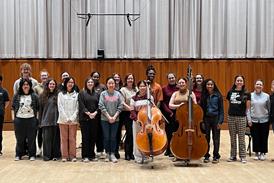The violin-cello sibling duo of Luka and Léo Ispir speak to The Strad about their lifelong collaboration and inspiration, culminating in a debut album thanks to the Fondation Gautier Capuçon

Discover more Featured Stories like this in The Strad Playing Hub
Renaud and Gautier Capuçon: one of the most prominent and successful violin-cello sibling duos of modern times.
Following in the footsteps of the Capuçons are another pair of French brothers, Luka and Léo Ispir. Violinist Luka, aged 26, and cellist Léo, aged 23, were born in Rouen, hailing from a musical family. The Ispirs thank their mother for encouraging them to practise at home daily, and as soon as they could play, started playing together.
’We’ve always had a musical relationship that was full of the will to help each other,’ the Ispirs told The Strad. ’As we grew up, that feeling grew with us - we would give each other advice and always be very present for each other.’
The Ispirs were inspired by the Capuçon brothers growing up, ’as is every child who starts playing violin or cello in France,’ they say. This inspiration continued as the brothers went through the Fondation Gautier Capuçon, the initiative set up by the eponymous cellist in 2022 to support talented young artists in the first steps of their careers.
Part of the foundation’s scheme includes a partnership with Warner Classics, which grants laureates of the foundation the opportunity to record their first CD with the label.
’The Fondation Gautier Capuçon is a little miracle for us,’ say the brothers. ’Thanks to the care they gave us, they made our dream come true and we are beyond words to thank them.’
So how have the brothers realised their dream recording? The Ispirs’ album features Ravel’s Sonata for Violin and Cello, a monumental work for the instrumentation:
’Few composers tried to write for this formation,’ they say. ’In this context, the Ravel’s Sonata is really the masterpiece for us. This Sonata shows all the genius of Ravel and we could not have recorded our first CD without it.’
The brothers have also recorded Mozart’s String Duo No. 1 in G Major, plus new arrangements of music by Bach created by the brothers themselves. The album also includes the world premiere recording of Fazil Say’s Street of Memories, which the Ispirs selected for its connection to their own Turkish roots, as well as their desire to expand the violin-cello duo repertoire.
’For us, it is really important to be open and connected to contemporary composers. As we had complete freedom for this album, it was very natural for us that we would ask Fazil Say to compose a piece for us, and we could not have asked for more! This piece is full of passion and has a very dynamic and rhythmic character.’
The album is completed with the Handel/Halvorsen Passacaglia, a staple of string duo repertoire, and one of the first pieces the brothers played together as children. ’it’s quite short but extremely powerful, and it gathers a wide range of characters and feelings that make this piece really enjoyable to listen to.’
Luka and Léo Ispir’s new album is released on Erato on 6 June 2025.
Read: The musical pride of France: The Capuçon brothers’ Olympic journey (so far!)
Read: The ‘folk’ in my bond with folk music: my parents, Teresa Teng, and Béla Bartók
Discover more Featured Stories like this in The Strad Playing Hub
The number one source for playing and teaching books, guides, CDs, calendars and back issues of the magazine.
In The Best of Technique you’ll discover the top playing tips of the world’s leading string players and teachers. It’s packed full of exercises for students, plus examples from the standard repertoire to show you how to integrate the technique into your playing.
The Strad’s Masterclass series brings together the finest string players with some of the greatest string works ever written. Always one of our most popular sections, Masterclass has been an invaluable aid to aspiring soloists, chamber musicians and string teachers since the 1990s.
The Canada Council of the Arts’ Musical Instrument Bank is 40 years old in 2025. This year’s calendar celebrates some its treasures, including four instruments by Antonio Stradivari and priceless works by Montagnana, Gagliano, Pressenda and David Tecchler.













































No comments yet